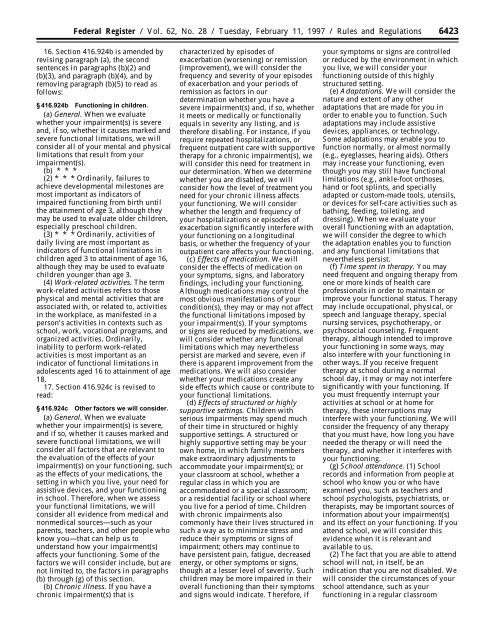federal register - U.S. Government Printing Office
federal register - U.S. Government Printing Office
federal register - U.S. Government Printing Office
Create successful ePaper yourself
Turn your PDF publications into a flip-book with our unique Google optimized e-Paper software.
Federal Register / Vol. 62, No. 28 / Tuesday, February 11, 1997 / Rules and Regulations642316. Section 416.924b is amended byrevising paragraph (a), the secondsentences in paragraphs (b)(2) and(b)(3), and paragraph (b)(4), and byremoving paragraph (b)(5) to read asfollows:§ 416.924b Functioning in children.(a) General. When we evaluatewhether your impairment(s) is severeand, if so, whether it causes marked andsevere functional limitations, we willconsider all of your mental and physicallimitations that result from yourimpairment(s).(b) * * *(2) * * * Ordinarily, failures toachieve developmental milestones aremost important as indicators ofimpaired functioning from birth untilthe attainment of age 3, although theymay be used to evaluate older children,especially preschool children.(3) * * * Ordinarily, activities ofdaily living are most important asindicators of functional limitations inchildren aged 3 to attainment of age 16,although they may be used to evaluatechildren younger than age 3.(4) Work-related activities. The termwork-related activities refers to thosephysical and mental activities that areassociated with, or related to, activitiesin the workplace, as manifested in aperson’s activities in contexts such asschool, work, vocational programs, andorganized activities. Ordinarily,inability to perform work-relatedactivities is most important as anindicator of functional limitations inadolescents aged 16 to attainment of age18.17. Section 416.924c is revised toread:§ 416.924c Other factors we will consider.(a) General. When we evaluatewhether your impairment(s) is severe,and if so, whether it causes marked andsevere functional limitations, we willconsider all factors that are relevant tothe evaluation of the effects of yourimpairment(s) on your functioning, suchas the effects of your medications, thesetting in which you live, your need forassistive devices, and your functioningin school. Therefore, when we assessyour functional limitations, we willconsider all evidence from medical andnonmedical sources—such as yourparents, teachers, and other people whoknow you—that can help us tounderstand how your impairment(s)affects your functioning. Some of thefactors we will consider include, but arenot limited to, the factors in paragraphs(b) through (g) of this section.(b) Chronic illness. If you have achronic impairment(s) that ischaracterized by episodes ofexacerbation (worsening) or remission(improvement), we will consider thefrequency and severity of your episodesof exacerbation and your periods ofremission as factors in ourdetermination whether you have asevere impairment(s) and, if so, whetherit meets or medically or functionallyequals in severity any listing, and istherefore disabling. For instance, if yourequire repeated hospitalizations, orfrequent outpatient care with supportivetherapy for a chronic impairment(s), wewill consider this need for treatment inour determination. When we determinewhether you are disabled, we willconsider how the level of treatment youneed for your chronic illness affectsyour functioning. We will considerwhether the length and frequency ofyour hospitalizations or episodes ofexacerbation significantly interfere withyour functioning on a longitudinalbasis, or whether the frequency of youroutpatient care affects your functioning.(c) Effects of medication. We willconsider the effects of medication onyour symptoms, signs, and laboratoryfindings, including your functioning.Although medications may control themost obvious manifestations of yourcondition(s), they may or may not affectthe functional limitations imposed byyour impairment(s). If your symptomsor signs are reduced by medications, wewill consider whether any functionallimitations which may neverthelesspersist are marked and severe, even ifthere is apparent improvement from themedications. We will also considerwhether your medications create anyside effects which cause or contribute toyour functional limitations.(d) Effects of structured or highlysupportive settings. Children withserious impairments may spend muchof their time in structured or highlysupportive settings. A structured orhighly supportive setting may be yourown home, in which family membersmake extraordinary adjustments toaccommodate your impairment(s); oryour classroom at school, whether aregular class in which you areaccommodated or a special classroom;or a residential facility or school whereyou live for a period of time. Childrenwith chronic impairments alsocommonly have their lives structured insuch a way as to minimize stress andreduce their symptoms or signs ofimpairment; others may continue tohave persistent pain, fatigue, decreasedenergy, or other symptoms or signs,though at a lesser level of severity. Suchchildren may be more impaired in theiroverall functioning than their symptomsand signs would indicate. Therefore, ifyour symptoms or signs are controlledor reduced by the environment in whichyou live, we will consider yourfunctioning outside of this highlystructured setting.(e) Adaptations. We will consider thenature and extent of any otheradaptations that are made for you inorder to enable you to function. Suchadaptations may include assistivedevices, appliances, or technology.Some adaptations may enable you tofunction normally, or almost normally(e.g., eyeglasses, hearing aids). Othersmay increase your functioning, eventhough you may still have functionallimitations (e.g., ankle-foot orthoses,hand or foot splints, and speciallyadapted or custom-made tools, utensils,or devices for self-care activities such asbathing, feeding, toileting, anddressing). When we evaluate youroverall functioning with an adaptation,we will consider the degree to whichthe adaptation enables you to functionand any functional limitations thatnevertheless persist.(f) Time spent in therapy. You mayneed frequent and ongoing therapy fromone or more kinds of health careprofessionals in order to maintain orimprove your functional status. Therapymay include occupational, physical, orspeech and language therapy, specialnursing services, psychotherapy, orpsychosocial counseling. Frequenttherapy, although intended to improveyour functioning in some ways, mayalso interfere with your functioning inother ways. If you receive frequenttherapy at school during a normalschool day, it may or may not interferesignificantly with your functioning. Ifyou must frequently interrupt youractivities at school or at home fortherapy, these interruptions mayinterfere with your functioning. We willconsider the frequency of any therapythat you must have, how long you haveneeded the therapy or will need thetherapy, and whether it interferes withyour functioning.(g) School attendance. (1) Schoolrecords and information from people atschool who know you or who haveexamined you, such as teachers andschool psychologists, psychiatrists, ortherapists, may be important sources ofinformation about your impairment(s)and its effect on your functioning. If youattend school, we will consider thisevidence when it is relevant andavailable to us.(2) The fact that you are able to attendschool will not, in itself, be anindication that you are not disabled. Wewill consider the circumstances of yourschool attendance, such as yourfunctioning in a regular classroom


